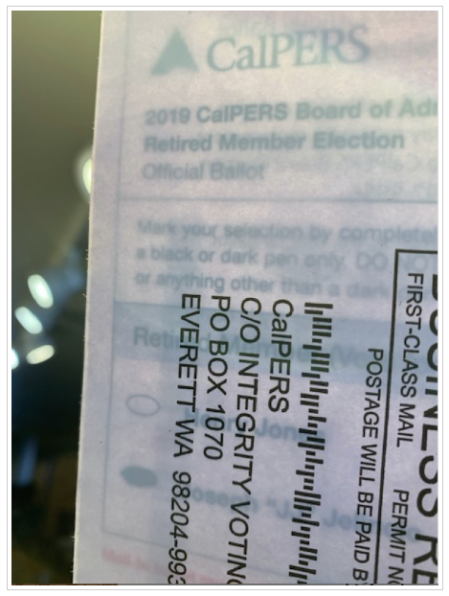The re-election of CalPERS President Henry Jones last week ended the comeback bid of former board member J.J. Jelincic, a maverick who helped challengers unseat incumbents in the last two elections, one of them former board president Priya Mathur.
Jones won by a wide margin, 66 to 34 percent unofficially. He was aided by at least $374,369 in spending by unions and others, an apparent record for a CalPERS board race, and by a nearly decade-old sexual harassment charge against Jelincic revisited in the “Me Too” era.
A Jelincic win would have continued an anti-establishment election trend and created a potential three-member faction on the 13-member CalPERS board, outsiders who won despite mainstream union support for their incumbent opponents.
A Corona police sergeant, Jason Perez, ousted Mathur last fall. His campaign, supported by some law enforcement groups, was focused on opposing “risky” pension fund investments driven by what are often called “environmental, social and governance” goals.
A Garden Grove school facilities planner, Margaret Brown, ousted Michael Bilbrey two years ago, running to keep a critical eye on the CalPERS board and staff. Her victory ended more than two decades of an unbroken string of board member re-elections.
Both outsiders and Jelincic had the support of two retiree groups, the Retired Public Employees Association and the California State Retirees. Their members are said to have a higher tendency to vote, making them a force in CalPERS elections, notorious for low turnout.
In the Perez election last year only about 6.4 percent (16,875) of the 258,899 eligible local government workers voted. In the Jones election last week about 19.3 percent (116,065) of the roughly 600,000 eligible retirees voted.
When Jelincic, after two four-year terms on the board, chose not to run for re-election two years ago, he said staff manipulation of the board, his original reason for running, was worse than he thought.
Last April Jelincic said he was running again because of changes on the board. Brown and Perez are not “rubber stamps” for board recommendations, he said, and Treasurer Fiona Ma and Controller Betty Yee were questioning some staff proposals.
Later, Ma delivered a major blow to Jelincic’s campaign. She issued an open letter in July urging him to withdraw from the race because an administrative law judge found in 2011 that he had sexually harassed three low-level CalPERS female employees.
The letter co-signed by CalPERS board member Theresa Taylor and state Sen. Connie Leyva said Jelincic was accused of “Leering at them; of making inappropriate comments about them; of making juvenile noises that school boys would make as girls walked by.”
Early in September a campaign mailer to CalPERS voters containing the Ma letter, in an envelope falsely suggesting it came from the state treasurer’s office, was traced by Sacramento Bee reporters to the SEIU, a large public employee union.
Asked at a campaign forum on Sept. 12 about being urged to withdraw, Jelincic said, “This is a hit piece and it’s a nine-year-old event. Breton, a columnist and opinion writer for the Sacramento Bee, in coordination with the CalPERS management, launched this attack.”
Ma’s letter on July 15 began with a reference to Marcos Breton’s column on the previous day headlined: “This California leader has a history of harassing women. It doesn’t seem to matter.”
Part of Jelincic’s defense at the forum: “It was not even alleged that I touched anyone, propositioned anyone, smelled anyone’s hair, or even asked them to join me for a cup of coffee . . . I do recognize that times have changed, and I’m sorry to have offended.”
Jones said Jelincic should have apologized in 2011 because his actions are “unacceptable in the workplace” and can cause fear and lower morale. Jelincic said he was “found guilty of violating the zero tolerance policy” and apologized at that time.
The CalPERS board response to actions like Jelincic’s are limited, Jones said, mentioning blocking travel, removal from committees, and a public sanction. Jelincic was reprimanded, stripped of some committee posts, and ordered to take sensitivity training.
“I would support some kind of legislation that will go further than that to have consequences for that kind of action,” Jones said.
Jelincic has been at odds with the CalPERS establishment since he won a board seat in the fall of 2009 by defeating Cathy Hackett, an SEIU officer. He had the support of the two retiree groups and a $74,812 independent expenditure from AFSCME, another large union.
Hackett had helped Jelincic win election as president of the California State Employees Association in 2003. Then four years later Hackett helped defeat Jelincic when he ran for re-election.
The Jelencic victory was an immediate problem for CalPERS management. A long-time CalPERS employee in investments was now also on the CalPERS board, a potential conflict of interest not resolved until Jelincic was placed on leave with pay in 2011.
After three opinions from the state attorney general, Jelincic was barred from closed-door board meetings on personnel, particularly about executives who might in the future be managing him.
Jelincic became known for asking many detailed questions about staff reports and for receiving reprimands. In addition to sexual harassment, one reprimand was for telling a national publication a new CalPERS chief investment officer lacked the needed “temperament” and “management skills”.
More seriously, Jelincic was accused of leaking confidential information from a closed-door board meeting and required to attend training on open-government laws. He denied that he leaked the information, which remains formally unidentified because it’s confidential.
Jelincic clashed with CalPERS management on major issues such as the reporting of private equity fees and, while campaigning this year, on a CalPERS proposal to create two private equity companies.
In a clash four years ago that seemed almost playful, Jelincic filed Public Records Act requests to get weekly reports from new federal lobbyists, as specified in their contract, rather than monthly reports approved by the board.
Jelincic also has worked with an opinionated investigative reporter, Susan Webber, who writes under the pen name Yves Smith on her website, Naked Capitalism. She revealed discrepancies in the resumes of two CalPERS executives last year.
A new chief financial officer, Charles Asubonten, left CalPERS in May. Chief Executive Marcie Frost, a high school graduate not enrolled in a college course as reported, retained strong board support with one exception. Former Treasurer John Chiang called for a probe.
Last month Webber, echoing her report two years ago that CalPERS required voters to sign the ballot rather than its envelope, showed how the CalPERS ballot envelope reveals votes, in her view violating secret ballot requirements and inviting tampering. (See her photo below.)
“This is the exact same ballot/envelope used in the last two elections (Brown and Perez victories), both of which were certified by the California Secretary of State,” said Wayne Davis, CalPERS spokesman. “No similar issues were raised then.”
Whether Webber and Jelincic, who has been speaking during public comment at some board meetings, continue to keep an eye on CalPERS remains to be seen. Meanwhile, Brown often has long lists of questions at board meetings.
[divider] [/divider]








